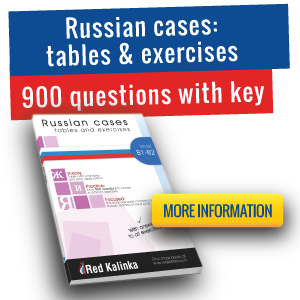Questions and Answers
Find an answer to your doubts about Russian grammar and vocabulary
Our language experts have gathered here the most common and interesting questions about Russian grammar and vocabulary. Discover the secrets of Russian verbs, case system and pronunciation.
1. What’s the difference between the conjunctions “и” and “а”? Do they both mean “and”?
Usually, the connectors “a” and “и” are both translated as “and” in English. But their meanings are slightly different. Let’s see the situations in which we use them in Russian.
We use "a" in the following situations:
- There is some kind of contradiction or contrast between the previous sentence and the next one (or between clauses in a complex sentence):
- Я люблю кофе. А мои друзья любят чай. = I like coffee. And my friends like tea.
- Я люблю кофе, а не чай. = I like coffee and not (=but not) tea.
- Я люблю кофе, а мои друзья любят чай. = I like coffee and (=but) my friends like tea.
- You make a question like "And you?"
- Я люблю чай. А ты? = I like tea. And you?
- Меня зовут Анна. А вас? = My name is Anna. And yours?
It's a bit close to "while" in English (I like this, while they like something else). Sometimes we can translate “a”, as “but”; however, keep in mind, that "a" expresses a “contrast”, rather than pure “opposition”. To express an opposition we also have "but" in Russian (но).
We use "и":
- to connect two words in one sentence (typical meaning of "and").
- Я люблю чай и кофе. = I like tea and coffee.
- to connect two clauses that have the meaning of "I do it and they do it too":
- Я люблю кофе, и мои друзья любят кофе (in the meaning of "тоже"). = I like coffee and my friends like coffee too.
2. Are "любить" and "нравиться" synonyms? What's the difference between them?
These verbs may seem quite similar in meaning but are very different in the way we use them.
- Meaning. The verb "нравиться" means "to like" while the verb "любить" is closer to the English verb "to love". In certain context this difference might become quite important. Compare:
- Я люблю читать. = I love reading.
- Мне нравится читать. = I like reading.
- Я люблю тебя. = I love you.
- Ты мне нравишься. = I like you.
- Grammar. The verb "любить" requires a direct object in the accusative case. The verb "нравиться" uses a different structure and the dative case. Let's have a look:
- Я люблю вкусную еду. = I love/like delicious food. The words "вкусную еду" are in the accusative case.
- Мне нравится вкусн ая еда. = (literally) Delicious food pleases me. The words "вкусная еда" are in the nominative case because they are the subject of the sentence. Who pleases me? The food does. The word "мне" is in the dative case.
- Я люблю мою кошку. = I love my cat.
- Мне нравится моя кошка. = (literally) My cat pleases me.
- "I love it!". In English, it's typical to express your opinion about something using the phrase "I love it!" In Russian, only the verb "нравиться" should be used in this meaning.
- Какое у тебя красивое платье! Мне очень нравится! = What a beautiful dress you have! I love it!
- Вчера мы ходили в театр. Мне понравилось! = Yesterday we went to the theatre. I loved it! The verb "понравиться" is a perfective couple of the verb "нравиться" it means that you liked something (a finished action in the past)
3. Do people in Russia study the grammar of their native language?
Russian speakers study the Russian language in school, but not as a foreign language. So, of course, little children usually can speak Russian when they go to school, but their vocabulary is limited and not always correct. They cannot write at first and gradually learn spelling rules and gain their proficiency in writing.
Step by step, we study orthography and how to express ourselves correctly. We study grammar, but from another perspective: how to analyze and correct what you've said or have written, for example: what subject and predicate mean and how to identify them; the names of the cases and their analysis in a sentence or a phrase (but not how to build-up each case). We learn a lot of spelling rules and basic linguistic analysis. We write compositions, dictations and retell stories. We learn reasoning in Russian and expressing our opinions.
In Russian education system, the special focus is on literature and its analysis, we study this a lot. So we have two main subjects: the Russian Language and Russian Literature.
Studying a foreign language is different from studying your native language. Any kid learns a language from zero, but he or she is surrounded by this language the whole day for 6-7 years before they go to school, so this is already a very comprehensive input. Then children go to school and read and write lots of material in their native language, thus learning lots of things. School helps them gain literacy and learn the analysis of their language.
When you learn a foreign language, your concepts are already formed with the help of another language. In addition to this, quite often one cannot be surrounded by a new language 24h per day and totally detach himself/herself from his/her native language, so special links between these two languages should be built. When learning a foreign language, the most essential thing is getting vocabulary and grammar input by listening, reading, writing and speaking as much as possible.
4. What is the difference between "привет" and "здравствуй(те)"?
- "Привет" is used only in informal situations normally with your friends or close people. It is never used in semi formal or formal situations., i.e. we can use “привет” in very limited situations.
- "Здравствуйте" is formal and is used in plenty of situations (addressed to 1 person or many people): almost always to people you don't know well or in any formal situation or at least slightly formal (neighbours, salespersons, teachers, passers-by etc.) Note: It could sound with a slight variation [здраст(в)у(й)те], as we can pronounce it quickly. Some other short forms exist, but they don't always sound well.
- "Здравствуй" is addressed to 1 person, and it is really strange as it it neither formal, nor informal, it is rarely used and really specific, e.g. it could be used when addressing a child in a semiformal way or 1 person you used to know well, but haven't seen for a long time, etc.
5. Is Russian word order really flexible or are there rules?
Russian word order seems to be flexible but it follows a very important rule: the "new" information usually stands at the end of the sentence. So, any word order is grammatically correct but the meaning of the sentences will be slightly different. Let's take this sentence as an example:
- Я часто хожу в магазин. = I often go to the shop. This word order is neutral.
- Часто я хожу в магазин.= Often, I go to the shop. (Where do I go?)
- Я хожу в магазин часто.= I go to the shop often. (How often do I go to the shop?)
- Часто в магазин хожу я.= The one who often goes to the shop is me. (Who goes to the shop?)
If you change the neutral word order you’d probably put more importance on the word at the end or mark it as a new one. Read these sentences out loud to stress the last word:
That's basically how Russian word order works. The neutral word order is quite simple (Subject + Predicate + Object). Once you start changing it, you also slightly change the meaning of the sentence. However, the intonation is also important. Sometimes the intonation can show what information is more important without any word order shifts. Anyways, even If you make a mistake, it won't be a big mistake.

Learn Russian without spam
We want to help you learn Russian. Do you want to receive news from us? Subscribe to our newsletter. You will only receive one email a month with 100% news and 0% spam:
|
Contact us Site map Terms of use Privacy policy Shop - Russian school Copyright © www.russianforfree.com All rights reserved. |


